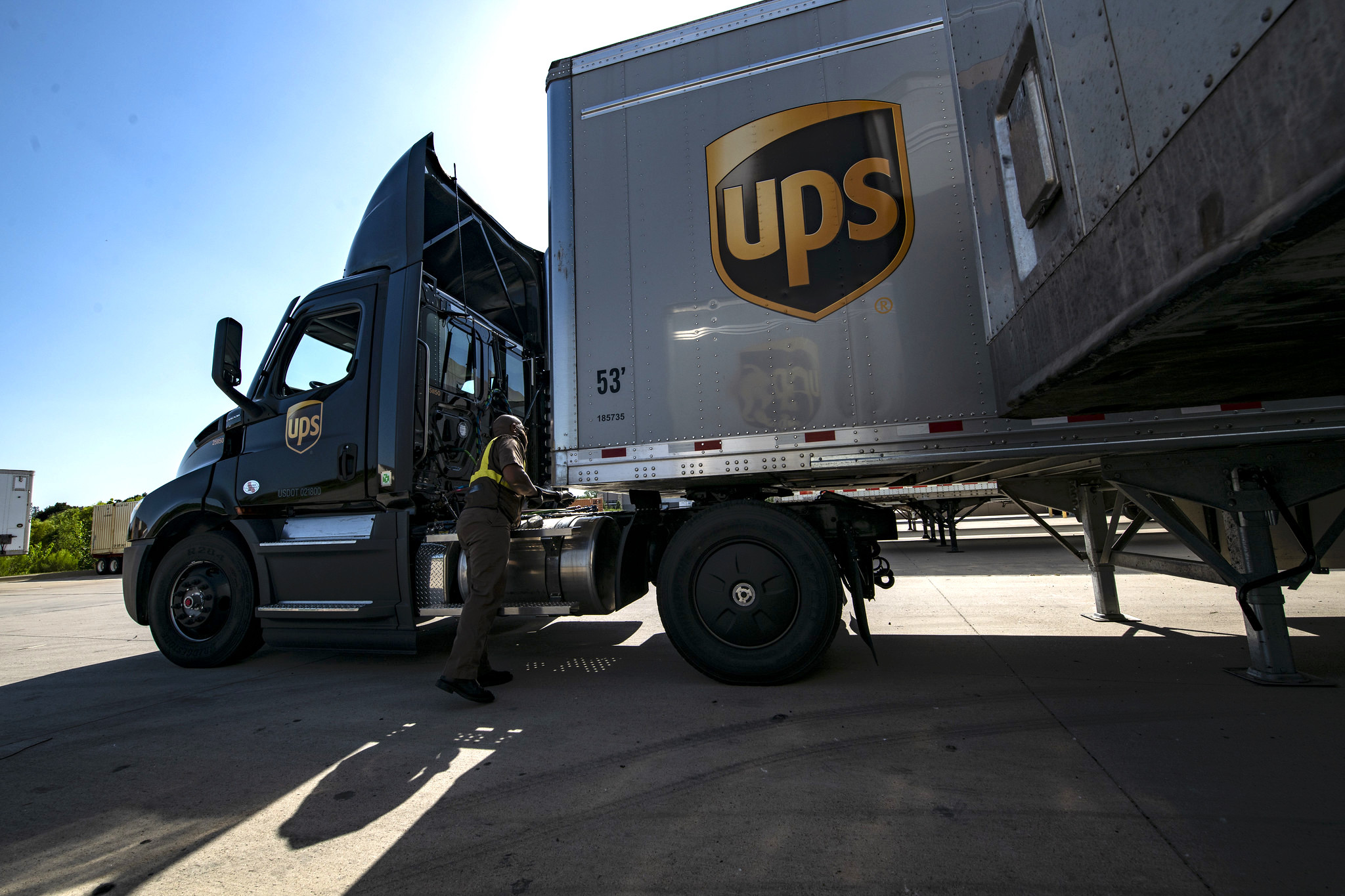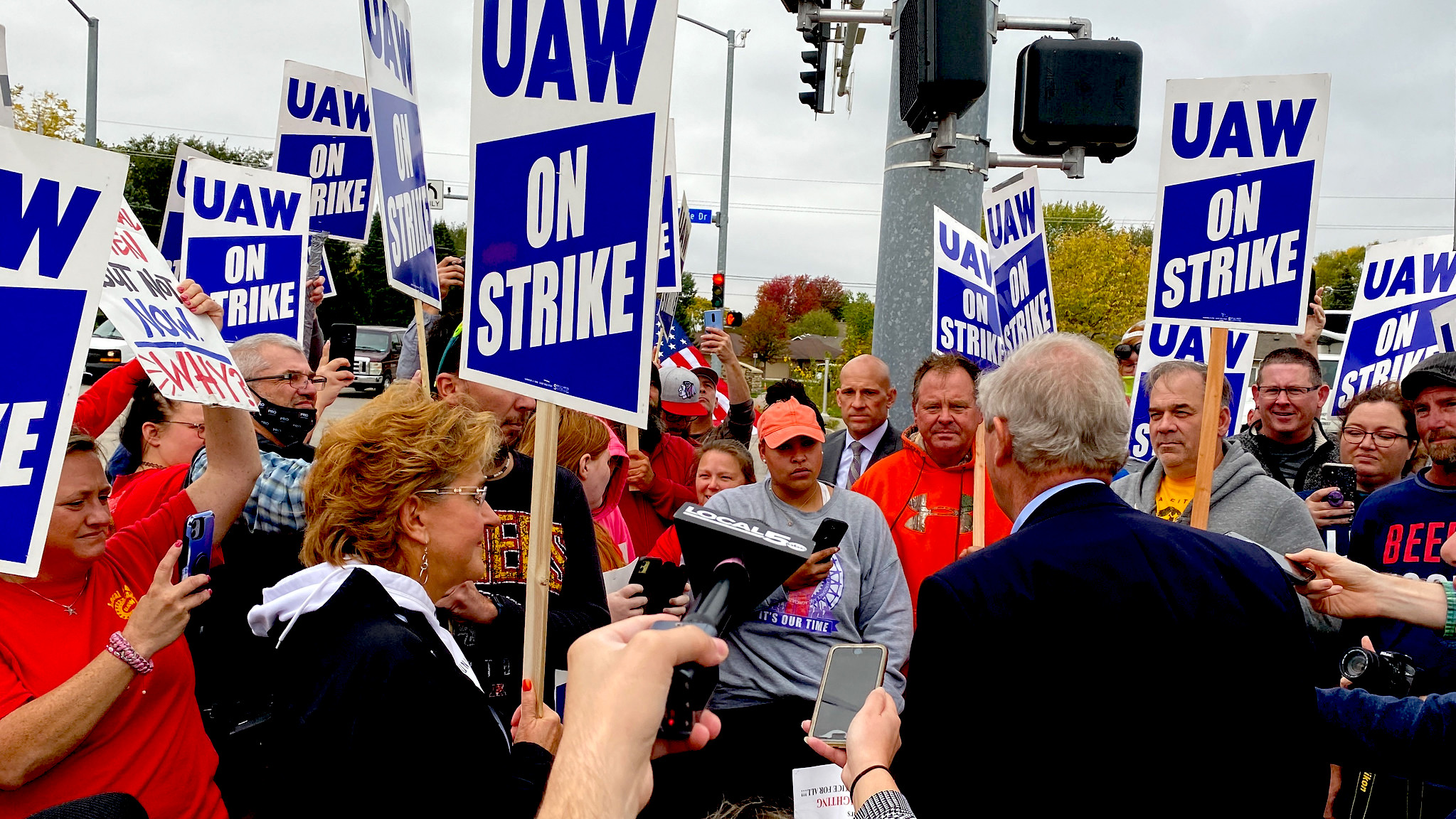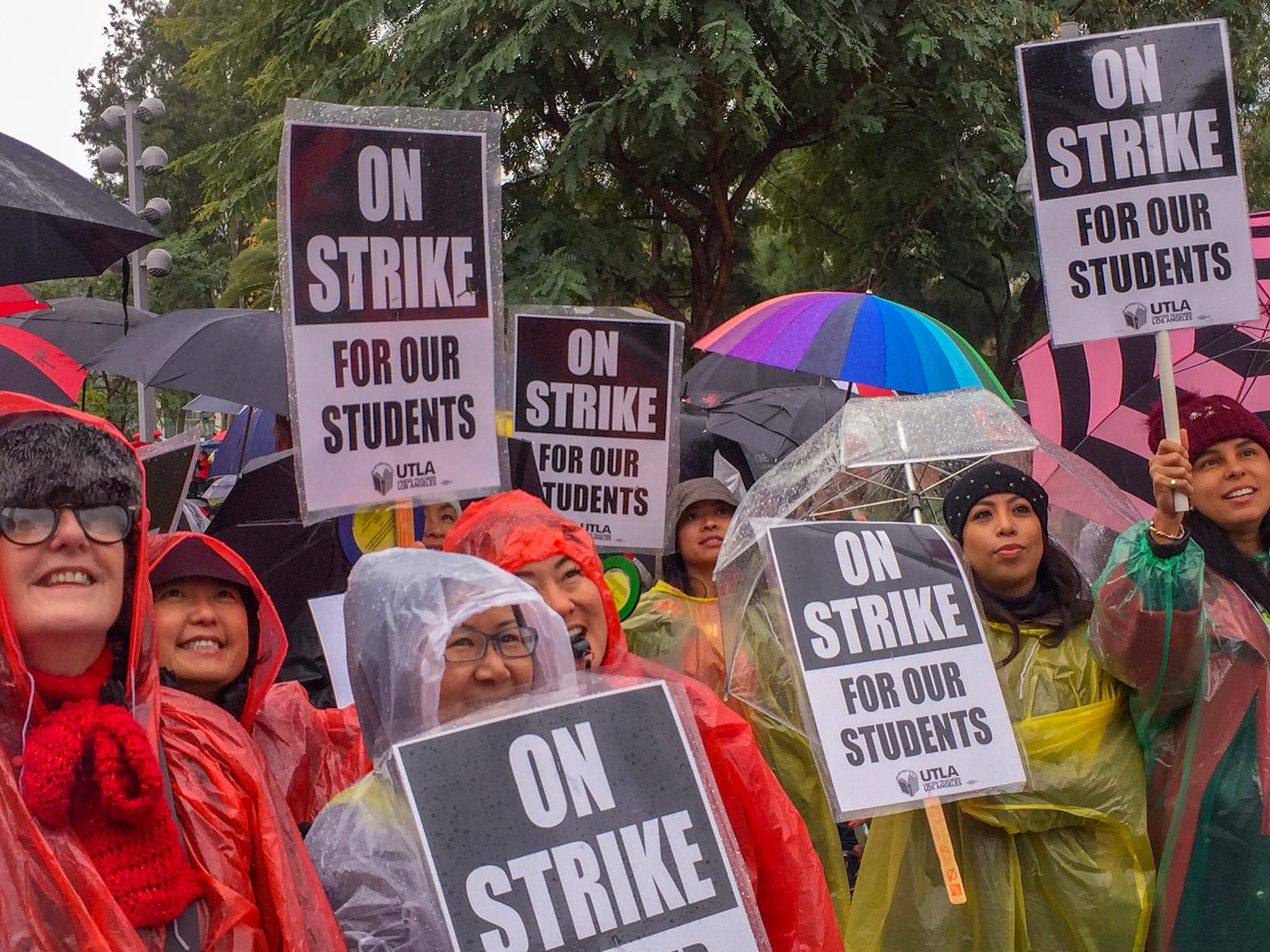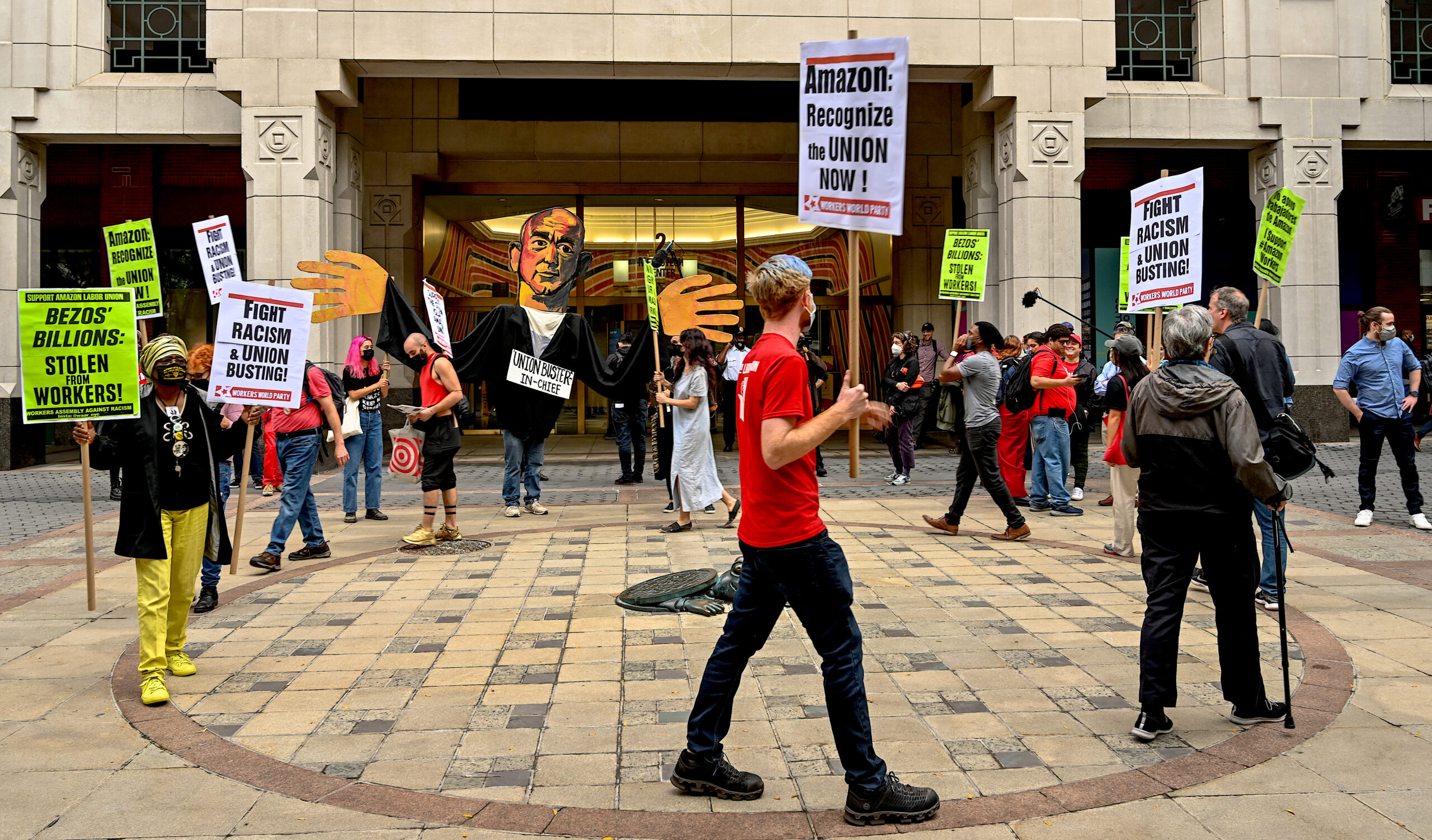Workers are hoping to take advantage of a tight labor market to reverse years of concessions and win big raises to help cope with inflation, Dan DiMaggio reports.

UPS driver working during early phase of Covid-19 pandemic at logistics warehouse in Grand Prairie, Texas, August 2020. (USDA Media by Lance Cheung)
 Negotiations will take place in 2023 over some of the biggest contracts in the labor movement, including at UPS and the Big Three automakers.
Negotiations will take place in 2023 over some of the biggest contracts in the labor movement, including at UPS and the Big Three automakers.
Workers are hoping to take advantage of a tight labor market to reverse years of concessions and win big raises to help cope with inflation. New leaders in the Teamsters, and potentially the United Auto Workers (UAW), have promised to put up a more aggressive fight.
UPS
The Teamsters contract covering 340,000 package car drivers and warehouse workers at UPS expires July 31. New Teamsters President Sean O’Brien has promised the union will be ready for the first strike against the parcel giant since 1997.
“The days of concessions and walking all over our members are over,” he said in August, kicking off the contract campaign. “We won’t extend negotiations by a single day. We’ll either have a signed agreement that day or be hitting the pavement.”
Among the issues are excessive overtime, low pay for part-timers, subcontracting, driver-facing cameras and ongoing harassment by supervisors.
There’s a target on two-tier. Already infesting UPS facilities, two-tier was expanded in 2018 to create an underclass of package car drivers. That contract was so unpopular that the old Teamster leaders could impose it only by invoking an undemocratic two-thirds-to-reject rule. That language was repealed at the 2021 convention.

Teamsters’ Sean O’Brien at a rally in Philadelphia on Aug. 20. (Ted Merriman, CC BY-SA 4.0, Wikimedia Commons)
Auto
The Big Three contracts, covering 150,000 auto workers at Ford, General Motors and Stellantis (formerly Chrysler), expire on Sept. 14.
Members are hungry for a new direction — that is clear from the results of the recent UAW elections.
Among the issues in negotiations will be two-tier wages and benefits — new hires start at just $17 an hour and get a 401(k) instead of a pension — and winning back cost-of-living adjustments. Job security will also be a major issue, as the industry shifts to electric vehicle production.
Postal
The contract covering 200,000 city letter carriers expires May 20. (Postal workers, the nation’s largest union workforce, are split among four unions.)
Understaffing is severe. Letter carriers are working till long after dark, with few days off. New hires start on a lower tier and are made to work Sundays delivering for Amazon; turnover is high.
Support CN’s Winter Fund Drive!
If ever there was a year to defeat two-tier, this is it — the Postal Service is so desperate that in some areas it’s already hiring straight into tier one. And high-profile contract battles against two-tier at UPS and the Big Three should put the wind in labor’s sails.
A letter carrier strike is highly unlikely, though — not only because it’s illegal (which didn’t stop the great postal strike of 1970) but also because this not a union that mobilizes. Last time around there was no survey on bargaining priorities, never mind rallies or shop floor action. Prove us wrong!
Caterpillar
UAW contracts covering 5,000 workers at heavy equipment manufacturer Caterpillar in Illinois expire on March 1.
The 2021 John Deere strike, where workers won immediate 10 percent raises and preserved the pension for new hires, will likely serve as inspiration. Meanwhile, 1,100 UAW members at CNH in Iowa and Wisconsin have been on strike since May over three-tier wages (lower than their counterparts at CNH’s non-union plants) and forced overtime.

U.S. Department of Agriculture Secretary Tom Vilsack, back to camera, with the United Auto Workers Local 450 strikers at the John Deere plant in Ankeny, Iowa, Oct. 20, 2021. (USDA/Lance Cheung)
Caterpillar has viciously fought its unions for 30 years; the company is already training managers and has begun its fearmongering campaign in case of a strike.
Locomotives
The United Electrical Workers (UE) contract covering 1,400 locomotive manufacturing workers in Erie, Pennsylvania, is up on June 9.
Workers there struck for nine days in 2019 and beat back most of the concessions being pushed by new owner Wabtec, which had bought the plant as part of its purchase of GE Transportation. Wabtec was attempting to impose a new contract that instituted mandatory overtime, slashed pay for new hires and recalled workers, and allowed the company to hire non-union temps for 20 percent of the plant’s jobs.
Keeping jobs in Erie is a longstanding issue at the plant; Wabtec operates a nonunion factory in Texas. The union is backing efforts to force railroads to swap older, dirty locomotives for new green locomotives that could be produced in Erie.

Erie, Pennsylvania, from the Amtrak Lakeshore Limited, 2014. (The West End, Flickr, CC BY-NC-ND 2.0)
General Electric
The contract covering 3,000 members of International Union of Electrical Workers (IUE-CWA) locals at several General Electric manufacturing facilities expire on June 18. They make jet engines, among other things.
GE union members from as far away as Kansas and Kentucky rallied at the company’s headquarters in Boston in October demanding the company invest more in its U.S. plants, including adding thousands of jobs to recently closed plants.
Workers are also pushing for cost-of-living increases and more affordable health care. Earlier this year GE announced plans to split its remaining assets into three separate companies — aviation, health care and power — which the union says is just another scheme to reward Wall Street.
Airlines
The five unions at United Airlines, including the Flight Attendants (AFA-CWA), Machinists, the Airline Pilots Association, the Teamsters, and a union of flight dispatchers, just announced they have formed a coalition to coordinate bargaining. The pilots overwhelmingly rejected a contract offer.
Contracts have expired for most of these unions, but bargaining is governed by the lengthy process laid out under the Railway Labor Act.
Over at American Airlines, the flight attendants are picketing to protest overwork, exhaustion, and health care costs as they negotiate their contract. The pilots’ contracts are outstanding at American and Southwest, too.
Education

UTLA strike, Venice, California, Jan 14, 2019. (Wilson Pumpernickel, Flickr, CC BY-NC-ND 2.0)
Members of United Teachers of Los Angeles have been working under an expired contract since June. They are pushing for a 20 percent raise over two years, smaller classes and less standardized testing.
The 30,000 teachers at the nation’s second-largest school district struck for nine days in 2019, winning class-size reductions and a commitment from the district to provide a nurse in every school and a librarian in all middle and high schools.
In New York City, the nation’s largest school district, 110,000 educators are also working under an expired contract.
Meanwhile, 3,700 teachers in Portland, Oregon, are gearing up for a major contract mobilization; their agreement expires in June.
Other Expired Contracts
The 22,000 Longshore (ILWU) union members at West Coast ports are working under a contract that expired in July. Issues include jurisdiction, wages, benefits, and automation.
NewsGuild members at the New York Times staged a one-day strike Dec. 8; their contract has been expired since March 2021.
First Contract Fights

Workers from four Amazon warehouse on Staten Island rallied outside the National Labor Relations Board in downtown Manhattan. They delivered containers with signed cards, petitioning the board to authorize a union vote, Oct. 25, 2021. (Joe Piette, CC BY-SA 2.0, Wikimedia Commons)
Some of the biggest fights in 2023 are likely to be around first contracts. That includes the 7,000 Starbucks workers who have voted to unionize, as well as workers at Trader Joe’s, REI and Amazon.
Dan DiMaggio is assistant editor of Labor Notes.dan@labornotes.org
This article is from Labor Notes.
The views expressed are solely those of the author and may or may not reflect those of Consortium News.
Support CN’s
Winter Fund Drive!![]()
Donate securely by credit card or check by clicking the red button:


None of these union apparatuses will do anything to change the status quo of enriching the corporations at the expense of its rank and file. One only needs to look at how the governments intervention and the union bureaucracies capitulation in the recent railroad workers fight turned out. The workers couldn’t even get one paid sick day. What will happen is what happen last year, and for the past forty years ever since the PATCO strike in 1981, the rank and file will be swindled by the six figure salaried charlatans and criminals who say they have their back and the corporations will continue to make it rain for their stockholders.
The recent election of the UAW had less than a 1% turnout, one of the lowest turnouts for any election in American history. Of 1.1 million eligible voters only 104,000 and change voted. This was the UAW bureaucracies deliberate attempt , keeping its rank and file in the dark by not posting information in plants and college campuses about the upcoming election, nor mailing ballots to all eligible voters, to maintain the status quo. The results of the election is that Curry and Fain who received 4% of the vote are in a runoff. 4%! There is one thing clear about that result, the rank and file are hungry for a new direction, but the big three automakers and the University system, along with their lap dogs in the UAW bureaucracy, as well as Joe Biden and his gang of goons, will continue to starve the rank and file out to appease Wall Street.
I agree 100% with your post – spot on. —————- Over the last several decades the big trade unions have become more extensions of management than a force that enables worker solidarity. Top union bosses don’t make three or four hundred thousand $ a year for nothing. They’ve rammed down the throats of workers sell-out contracts and have discouraged/curtailed more than a few strike actions.
——— The indictment several years ago of a few top UAW officials for taking bribes is just the tip of the iceberg.
Workers need to organize at the rank-and-file level to fully democratize the workplace. Dump the unions and have all decisions made at the shop floor level.
The current rhetoric in D.C about ‘fighting inflation’ is code-speak for WAGES MUST BE DEPRESSED.
Somehow the USA has managed to convince many of its citizens, and many people in other lands that it cares about human rights. A living wage, a health system for all, decent fair education for all, housing, legal rights surely are more important than “defense” which means spending a lot to enrich huge corporations, and making enough enemies to provide the victims. Why is it considered unreasonable to join with other workers to arrange fair conditions of work? Other “democratic countries” and many we consider autocratic seem to cope. Perhaps the individualism of the US character makes solidarity more difficult, but it is essential if fairness has any chance of success.
I’m shocked that you make no mention of the revolutionary campaign of SEP member Will Lehman for president of the UAW. He campaigned hard as a socialist candidate but the UAW deliberately sabotaged his efforts by (1) not properly notifying the workers and retirees that the election was even happening, and among those who knew about it, neglected to mail out ballots. Even with that sabotage, Will received more than 5,000 votes. This was a major campaign, with Lehman traveling all over the country. How can you just ignore that?